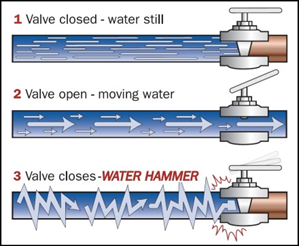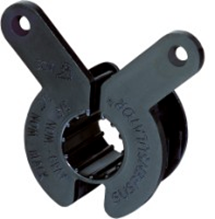Water Hammer
“Confidence is silent. Insecurities are loud.”
–Someone Wise
Water Hammer and Managing Your Water Pipe Pressure
If you’ve ever quickly flipped a faucet off and suddenly heard your house knock back at you, you’re likely experiencing water hammer. Water hammer, also known as hydrostatic shock or “air hammer” noise, happens when the appropriate measures aren’t in place to accommodate a natural, yet significant change in pressure in your water pipes.
Every time you quickly turn a faucet off, for example, the water then also has to quickly change directions, causing a drastic shift in the pipe’s internal pressure. If there is nowhere for that pressure to go, it will cause the pipe to jolt, “hammering” into whatever is next to it.
 Water hammer occurs most commonly with quick-closing, electrically operated valves, like those on your favorite, use-them-everyday household appliances (think washing machines and dish washers). Water hammer only occurs when the valves close. If you try closing the valve slowly and don’t hear anything, you can be sure it’s water hammer.
Water hammer occurs most commonly with quick-closing, electrically operated valves, like those on your favorite, use-them-everyday household appliances (think washing machines and dish washers). Water hammer only occurs when the valves close. If you try closing the valve slowly and don’t hear anything, you can be sure it’s water hammer.
If you’re hearing it hammer, it means it could be hitting the framing of your house or even another pipe. Since pressure waves can travel at more than 1,000 ft. per second, it’s always a warning sign of a larger problem waiting to happen.
Left unattended, water hammers can cause irreparable damage to your piping system. Pipes can burst, become disconnected, or crack the joints, all of which could lead to severe damage to the rest of your pipelines or even to the inside your house.
So how do you stop the hammering?
There are a several methods for stopping a water hammer, depending on the specific cause.
Sometimes, for example, water hammer occurs because a pipe-mounting strap has gotten loose. A pipe-mounting strap is what attaches your water pipes to the framing of your house to help reduce their movement when water is flowing through them. If a mount is loose, the pipe going through it is free to move about, which is never a good thing. If this is the case for you, you’ll need to tighten or replace the mount. Just be sure you don’t use galvanized or steel straps if you have copper piping. These materials together can react to create electrolysis, which lead to plumbing leaks. Clips and plumber’s tape help reduce this risk.
 These days, most mounts are built to act as shock absorbers, like the one pictured here.
These days, most mounts are built to act as shock absorbers, like the one pictured here.
Often, however, this solution alone won’t be enough. Because your house has water running through it at any given moment, it’s very important to have a few measures in place that are consistently managing your pipes’ pressure. Luckily for you, they are very simple and, in new installations, clamps and protective devices are standard anyway.
It’s much more common that you will simply install or replace either an air chamber or a water hammer arrester (also known as mechanical water arrestors).
Air chambers are vertical pipes connected to and directly next to water pipes. They should always be larger than the water supply line to reduce the possibility of becoming clogged. Air chambers act as shock absorbers by absorbing, and thereby reducing, the change in water pressure that would otherwise cause water hammer.
Depending on where in your house your water supply pipes are located, sometimes air chambers won’t be a viable option, as they need enough space to fit the right way.
In that case, you’ll want to opt for a mechanical water arrestor. Arrestors are sealed units with a spring and air bladder that absorb the water’s movement, which reduces the change in the pipe’s pressure. These are the go-to in commercial buildings and in situations with high water pressure applications. Note, however, that they need to be replaced after their life cycles have been reached (anywhere from 10,000 to 500,000 on/off cycles, depending on the type).
Knowing if your water pressure is within normal range is where an inspector or plumber can help you. In fact, there are a number of issues that help create the perfect conditions for water hammer in a home, so it’s possible you could be experiencing several problems at once. An inspector or plumber would be able to advise you on which solution is best for you.
So if you’re hearing a knock when you turn your water off, get in touch with an inspector or plumber to make sure the next knock you hear is one of them at the door to make it go away for good!
